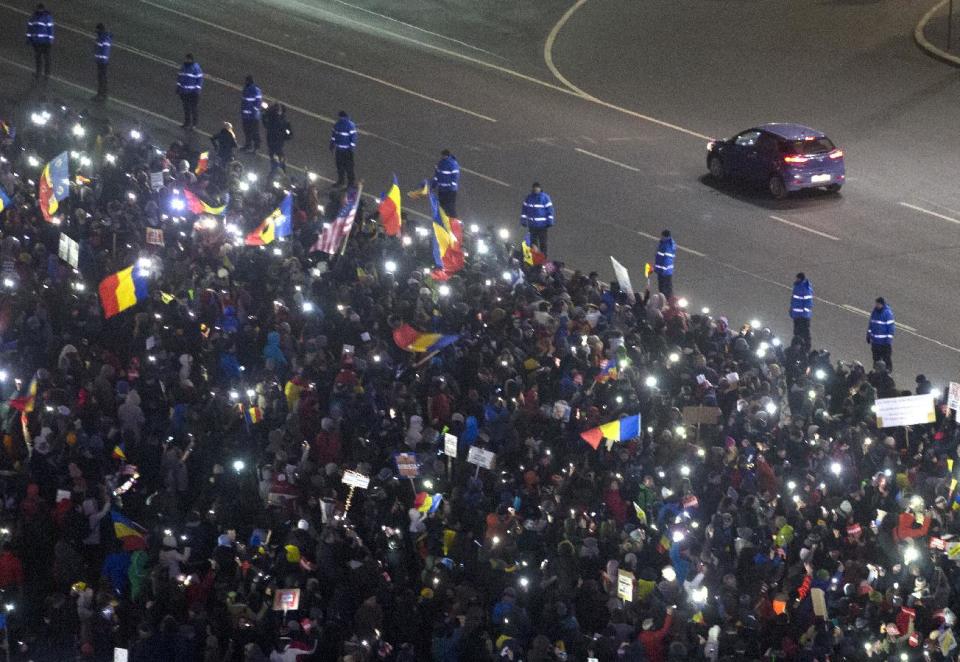AP Interview: Romanian president praises protesters
BUCHAREST, Romania (AP) — Corruption can't be stopped, but it must be controlled, even in a country where the abuse of power is a legacy of communist days. That's the message of Romania's president after a tumultuous week of protests derailed a government plan to weaken corruption laws by decree.
Klaus Iohannis told The Associated Press Wednesday that the fight to contain corruption in his country shows the "ugly face of politics" and praised protesters for standing up to block a government measure that would have eased up on public officials who abuse their power.
Massive street protests have for the moment halted the emergency decree that would have removed penalties for some graft if the amount involved was less than about $48,500.
Iohannis, 57, said he was pleased that protesters made their opposition known in peaceful demonstrations that spread from the capital Bucharest to other parts of the country.
"I was surprised by the size of the crowd," he said. "Having over 200,000 people in Piata Victoriei (Victory Square) is something extraordinary."
On Wednesday evening, several thousand braved a snowstorm to demonstrate against the government for the ninth day in a row in a central square.
A smaller, pro-government protest took place outside the presidential palace. Iohannis briefly interacted with protesters while aides offered them hot tea.
Iohannis, who was elected in 2014 by direct vote, was chairman of the opposition Liberal Party until he quit to seek the presidency, a post with limited powers.
He has been critical of the government headed by Prime Minister Sorin Grindeanu, which came into being after the December parliamentary elections.
He said widespread corruption is a stubborn remnant of the country's communist past, which ended with the 1989 popular uprising that toppled dictator Nicolae Ceausescu.
"It's certainly not going to finish in a year or two or four," Iohannis said at the ornate 17th Century presidential palace. "Intense anti-corruption fighting is not something nice. It brings up the ugly face of society we want to eradicate. But it takes time."
He said corruption would never stop but it could be greatly slowed, with fewer politicians and public employees tempted to exploit their positions in the face of increased prosecution and public resistance.
Iohannis seems to have emerged from the crisis in a stronger position. Grindeanu's center-left government appears to have miscalculated the public's response to its late night emergency decree last week.
It did survive a vote of no-confidence Wednesday, reflecting its continued support in Parliament.
The win had been expected because the Social Democratic Party and its junior partner, the Alliance of Democratic Liberals, enjoy a solid majority in Parliament even though analysts say their standing with the public has dropped in the past week.
The massive protests were the largest seen since communism collapsed in Romania in 1989.
Iohannis said the protests in Romania, a member of the European Union, serve democracy well.
"It's a very good way to say Europe is alive, it's alert, and basically positive," he said.
In Brussels, EU officials said they back Romania's anti-corruption effort, which has gained pace in recent years, threatening many entrenched interests and leading to the failed attempt to impose the emergency decree.
Frans Timmermans, EU rule-of-law chief, said Romania should maintain its pursuit of wrongdoers.
He said that Romanian authorities "should continue this fight which has been successful so far so it can reach the point of no return."
Timmermans said the EU is "on their side to make this happen."
___
Raf Casert in Brussels contributed.

 Yahoo News
Yahoo News 





